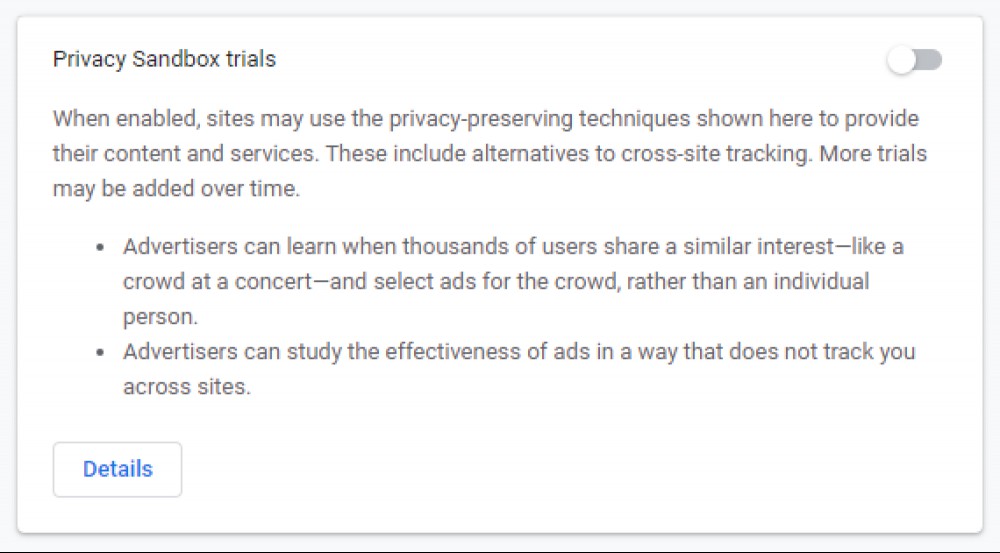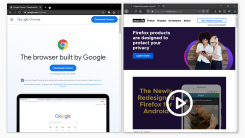How to Turn Off Alexa's Creepy 'Whisper Mode'
I love my smart speaker—as much as one can ever love a piece of privacy-stealing technology that only exists to gather information about you, I suppos

Internet users increasingly want a more anonymous browsing experience, which has a major impact on advertising, eCommerce, and the online economy as a whole. If a company can’t track you with third-party cookies, it’s harder to make money. Google is testing a new technology to replace cookies called Federated Learning of Cohorts (FLoC) that, according to Google, will help maintain user privacy and current business models for online companies.
You can read Google’s overview of the technology here, but the gist is that users will have a unique FLoC ID. Your ID is technically anonymous, but you’ll be grouped in with other users with similar internet history—your “cohorts.” Instead of selling an individual’s data, companies like Google will sell cohort data to advertisers.
But while “private” on paper, as we’ve previously explained, that’s not entirely true. In fact, FLoC is likely to be just as intrusive—if not more—than third-party cookies. Depending on the size of a cohort and the number of cohorts a person belongs to in the database, someone could plausibly be identified, among other serious concerns.
The good news is FLoC will only be implemented to Chrome—no other browser will use FLoC, not even other Chromium browsers like Brave, Edge, or Vivaldi. It also isn’t ready for full-scale implementation yet. In fact, Google delayed FLoC’s rollout for Chrome. However, it’s currently in an early trial phase, and it may be present on your browser right now as a new feature called “Privacy Sandbox.” To be fair, less than 1% of Chrome users are part of the Privacy Sandbox test, but the test may expand over time, and it’s possible you’re enrolled in this new form of tracking without even realizing it.
Luckily, it’s easy to check if Privacy Sandbox is enabled, and if it is, you can block it or opt-out.
Privacy Sandbox is only active for a tiny fraction Android and desktop Chrome users in the United States, Australia, Brazil, Canada, India, Indonesia, Japan, Mexico, New Zealand, and the Philippines. It is not on iOS devices (yet).

Still, it’s worth checking to see if the feature is active. These steps apply to Android, Windows, Mac, and Linux versions of Chrome:
Open Chrome and go to Settings > Privacy and security > Privacy Sandbox.
This will open the Privacy Sandbox landing page even if you’re not part of the Trial.
If the “Privacy Sandbox trials” toggle is turned on, then FLoC is enabled. Click/tap to disable it—just don’t turn it on if you don’t want to Chrome to use FLoC.

Alternatively, the “Am I FLoCed?” website quickly checks for the Privacy Sandbox trial on Chrome. If the test is positive, use the steps above to turn off FLoC tracking.
If you don’t see the option in Chrome’s settings, then you’re not part of the test. That doesn’t mean you won’t be added to the Privacy Sandbox trial in the future, however. Thankfully, Chrome users can preemptively block FLoC tracking using this DuckDuckGo browser extension.
[ZDNet]

I love my smart speaker—as much as one can ever love a piece of privacy-stealing technology that only exists to gather information about you, I suppos

Every time you take a photo with a digital camera or smartphone, your device adds extra information to the image file—metadata about the image that’s

If you’re a responsible person, you either voted in advance or braved lines (and COVID) to vote today. And that’s it. If you’re not planning to partic

New versions of Google’s Chrome and Mozilla’s Firefox browsers dropped yesterday, and if you haven’t yet updated, now’s as good a time as any: Visit t

After the release of iOS 14.3, I’ve been doing a little more digging into iOS 14, and I stumbled across a little trick I never knew about before, even

The Google Maps app now has a split-screen street view option on Android. Turning it on lets you use Street View and the map simultaneously, which mak

You might look at your sprawling list of to-dos in the iOS Reminders app and think, “That is a lot.” And while Apple’s upgrades to Reminders in iOS 14

While privacy as we used to know it might be dead and gone, there are still plenty of ways to protect yourself against the default tech standards on y
We are a comprehensive and trusted information platform dedicated to delivering high-quality content across a wide range of topics, including society, technology, business, health, culture, and entertainment.
From breaking news to in-depth reports, we adhere to the principles of accuracy and diverse perspectives, helping readers find clarity and reliability in today’s fast-paced information landscape.
Our goal is to be a dependable source of knowledge for every reader—making information not only accessible but truly trustworthy. Looking ahead, we will continue to enhance our content and services, connecting the world and delivering value.